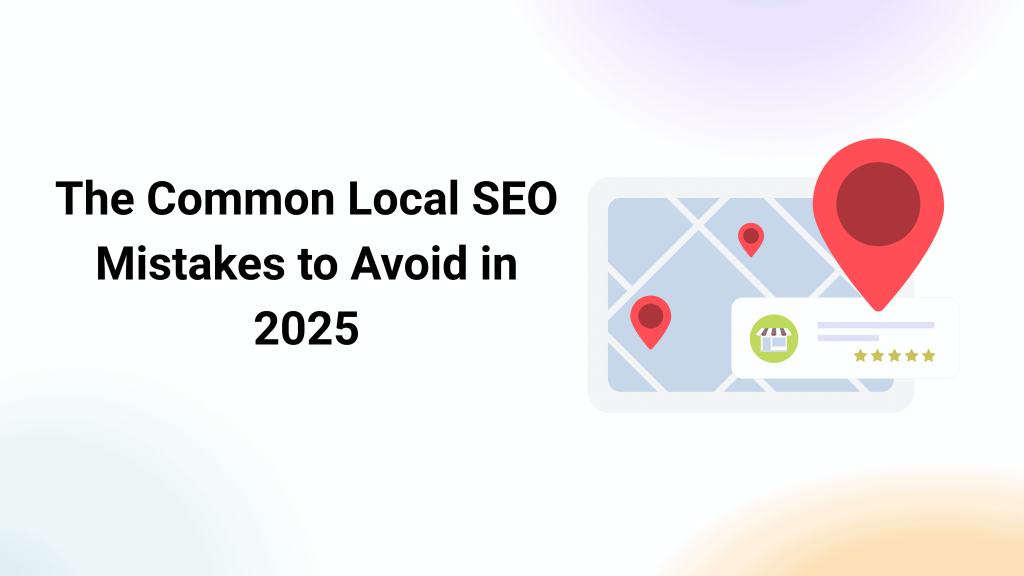
Local searches are more competitive in the year 2025 than they have ever been. No matter what term someone types into Google or what salon they search for nearby, your business needs to appear – or your competitors will.
Local search has become smarter and faster. It now works with advanced AI tools like Google’s AI Overviews, voice search, and Google Maps, which understand what people really want — not just what they type.
Still, many businesses continue to make simple but harmful local SEO mistakes. These can lower your rankings, reduce your online visibility, and cost you phone calls, visits, and customers.
In this post, we’ll explore the top local SEO mistakes to avoid in 2025, and more importantly, how to fix them — so your business can grow and stay ahead of the competition.
Quick Navigation
Top Local SEO Mistakes to Avoid
- Ignoring Google Business Profile (GMB)
- Mismatch in Business Info on Online Listing
- Keyword Stuffing
- Not Paying Attention to Customer Review
- Poor Mobile Experience
- Not Using Local Keywords
- Missing Local Backlinks
1. Ignoring Google Business Profile (GMB)
Google Business Profile (GMB) is a free tool that helps your business appear in local searches and Google Maps. Ignoring it means losing valuable visibility.
- Why Is GMB Important for Local SEO?
If your GMB profile isn’t claimed and optimized, your business might not appear in local searches. It also allows your customers to leave reviews about your services.
- How to Optimize Your GMB Profile?
Your business name, address, and phone number should be accurate. Include photos, a description, and respond to customer reviews.
2. Mismatch in Business Info on Online Listings
Mismatches and inconsistencies in your business information across online listings are common local SEO mistakes. In most cases, this relates to differences in your NAP (Name, Address, Phone Number) across platforms such as Google Business Profile, Yelp, Facebook, Apple Maps, Bing Places, and local directories.
Information that is mismatched has several common causes
- You moved to a new location, but failed to update all directories
- Old listings are still up and running after you rebranded or changed your business name
- The format of addresses (for example, “St.” or “Street”) or phone numbers differs
- Listings were created without coordination by multiple team members
- It is possible to find duplicate listings with different information
How Does Inconsistent Information Affect You?
If your name, address, or phone number (NAP) is not the same everywhere, Google may rank you lower. Customers might also get confused.
How to Fix NAP Inconsistencies?
- Audit Your Listings
Begin by searching your business name on Google and writing down every website where your business appears, such as Yelp, Facebook, Bing, and local directories. To save time and get a more complete list, use tools like Moz Local, BrightLocal, or consider hiring professional digital marketing agencies who specialize in local SEO audits and fixes at an affordable price.
- NAP information needs to be updated
It is important to verify that your business name, address, and phone number exactly match your existing official information. Pay attention to details like abbreviations (such as “St.” vs. “Street”) and formatting. Maintain consistency by updating outdated or incorrect listings as soon as possible.
- Delete or fix duplicate listings
If you find duplicate listings for the same business, delete them or contact the platform so they can be merged into a single accurate listing.
- Keep Checking Every Month
Consistency is not a one-time fix. New listings or changes can happen frequently, so it’s important to perform these audits regularly, ideally every month or every few months. Regular checks ensure your business info stays accurate, helping you rank better and making it easier for customers to find and contact you.
3. The keyword stuffing technique
The practice of keyword stuffing is the use of the same word or phrase over and over again in your content in an attempt to increase your rankings on Google, but it hurts your search engine optimization efforts.
- Why Keyword Stuffing Hurts SEO?
Google wants websites to give helpful and easy-to-read information. When you repeat the same keyword over and over, it sounds unnatural and confusing. This makes people leave your site quickly, and Google sees that as a bad sign. You might even get a lower ranking or a penalty..
- How to Use Keywords Properly?
Put your keywords in your page title, heading, and a few times in your content. Most importantly, answer the reader’s questions clearly. When your content is helpful and makes sense, Google will recognize it as a good result.
4. Ignoring customer reviews
Your business can suffer from not responding to bad reviews. Bad reviews that go unanswered can damage your reputation, and people may choose your competitors over you.
- What are the benefits of reviews?
When people see that other people have had a good experience, they’re more likely to choose your business. Google also considers reviews when ranking local businesses. So more positive reviews can boost your ranking.
- Review Management Best Practices
It is sometimes all it takes for a happy customer to leave a review on your site. Always respond to reviews, whether they are positive or negative. If someone had a bad experience, respond kindly and try to resolve it. Make your business even better by using what you learn from reviews.
5. Poor Mobile Experience
- Why Does Mobile Experience Matters ?
Today, most people use their phones to search for local businesses. If your website doesn’t work well on mobile, it can hurt your chances of showing up in search results.A bad mobile website hurts your rankings.
- Effects of Bad Mobile Usability
You may lose traffic if your site runs slowly, is hard to read, or is difficult to click on with a phone. Google lowers your ranking if you offer a poor user experience.
- Mobile Optimization Tips
You can use Google’s Mobile-Friendly Test to check how your site works on phones and get suggestions to improve it. Ideally, your website should load quickly, be easy to scroll and tap, and have clear, readable text.
6. Do Not use local keywords
- In the absence of local keywords, what events occur?
Your business listing might go undiscovered because of the absence of local keywords, meaning you might not show up in the searches of people looking for local businesses.
- What Are the Benefits of Local Keywords?
These are the words that help in directing people to your business within a limited radius, for example, the name of the city, neighborhood, or the area.
- Local Keywords: How to Add Them?
In the content of your webpages, make sure to include the name of your city or neighborhood in page titles, meta descriptions, headings, and even the content. Instead of “best dentist,” use “best dentist in Dhanmondi.” A local seo expert is often hired by businesses for local keyword targeting and improvement in ranking but specializes in keyword planning, optimization and research.
7. Not Enough local backlinks
- What Are the Benefits of Local Backlinks?
Your business might lose local rankings if Google considers your business low in importance and not trustworthy in the area due to lack of backlinks from other websites in the vicinity.
- Local Backlinks: What Are Their Benefits?
When credible websites from your neighborhood link to your site, your site’s authority is enhanced and thus you are more likely to appear in the local searches.
- What Strategies Can You Use to Obtain Backlinks for Your Local Website?
As a good example leveraging backlinks, a local blog or a news site or a community page can promote your business further. Make sure you add your business to local directories and consider sponsoring local events and business initiatives.
Summary
Through backlinks, your business can be discovered by more local customers by the year 2025. This can be achieved by claiming and optimizing your Google Business Profile, keeping your information consistent, performing local keyword research, review management, and website mobile optimization.




More Stories
Struggling to Get New Gym Members? Agency Fixes That
Path Into Digital Marketing Without a Degree
The Real Cost of Bad Content Marketing